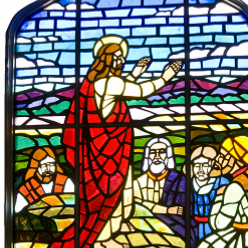Peter and Paul were pioneers of the Gospel message. There is only one known breakdown in communication between them, but this was solved.
Peter
Peter was the leading disciple among the twelve the Jesus chose to carry his message authoritatively into the future. He was the leading disciple in the work of creating the new Christian community among the Jewish believers. He was also the first to take the Gospel of non-Jews.
Peter was the one from whom all others took their lead.
Paul
Paul began as an opponent of the gospel, but was converted to be its strongest advocate by a personal encounter with Jesus.
He had a lot to learn, but quickly was preaching the new message in Arabia, on his own responsibility.
After this Paul went to Jerusalem to meet with Peter, and stayed with him for fifteen days (ca. 37 AD); he also met James, the brother of the Lord on the same occasion. Paul took this opportunity to learn first hand from Peter (and James); it also gave him the opportunity to test his own ideas against theirs.
After this, Paul was sent by the disciples back to his home town of Tarsus, in the province of Cilicia. It would appear that his vigour in debating the Grecian Jews provoked such a fierce reaction that they tried to kill him. Luke blandly reports that after Paul left, the Church had a time of peace in Judea, Samaria and Galilee!
Some time later Barnabas called upon Paul in Tarsus and invited him to join the flourish work in the city of Antioch in Syria – the third city in the Roman Empire – where they both taught large numbers of people about the saving message of Jesus.
In ca. 47, Barnabas and Saul were called upon to take the gospel to other places. At around this time, Paul again visited Jerusalem, in company with Barnabas, and this time he met with James, Peter and John. These men recognized that Barnabas and Paul had been called to a special work among the nations. Peter and the others encouraged the two men, and assured them of their support. So Barnabas and Paul were mentally buttressed for the arduous task that lay ahead of them.
Paul and Barnabas took the gospel message to Cyprus, and from there to southern Galatia, where they establishes churches in several towns, eventually returning to Antioch in Syria. Peter was there around the same time, and they all share fellowship together, also sharing meals with the non-Jewish Christians.
Crisis over meals
After some men came to Antioch from the churches in Judea a sharp dispute arose, since these visitors argued that it was not right for Jewish Christians to share meals with non-Jews. The issue was critical, with the possibility arising of Jewish and non-Jewish branches of the Church having to be established everywhere both groups were to be found, with shared meals being the point of division between them. As an act of peace towards the Judean Christians, Peter and Barnabas stopped sharing meals with non-Jews. Yet this was not a resolution, but left the problem in an entirely unsatisfactory situation. And so the matter remained, with Paul furious that Peter, and even Barnabas, had acted in a way that he considered to be spineless.
While the Council of Jerusalem was ostensibly called to resolve the question of the circumcision of non-Jews, and while there were a number of Jewish Christians agitating for a policy that would have added this requirement, the acknowledged leaders of the Church were not in dispute over this question. Paul makes this clear in his Galatian letter. At the council, after much debate, Peter silenced those who were opposed to his policy of not circumcising non-Jews, repeating the arguments he made when he explained why he had not required Cornelius to be circumcised before baptizing him. This closed that matter, as it had done before: nothing new was decided at this council on circumcision. After this, the council listened to Paul and Barnabas give an account of the nations turning to God. James then spoke up and ruled briefly on circumcision. In an abrupt turn, without any apparent discussion, he then gave a ruling on what was the substantive matter to be considered at the council, namely rules that were intended to set a minimum standard for Christian behaviour in the future.
“It is my decision … to instruct them to abstain from the pollutions of idols, from sexual immorality, things strangled, and from blood (Acts 15:19-20).â€
These were not really minimum rules for Christian living, as even a cursory reading of James’ letter would reveal: like Paul, James expected Christians to submit themselves entirely to God (Jam. 4:7), and not just follow this kind of minimum standard.
The decision of the Council of Jerusalem resolved the problem over food rules that had flared up in Antioch. This decision appears to have been decided beforehand by the leadership in Jerusalem, and had already been accepted by Paul before the council. So it is not surprising that Paul with him took a copy of the letter from the council’s leadership when he came to revisit the churches in southern Galatia.
Back on track
Peter and Paul were again back on the same path, and the Church was the stronger for having faced and dealt with it first major crisis among its leadership team.
